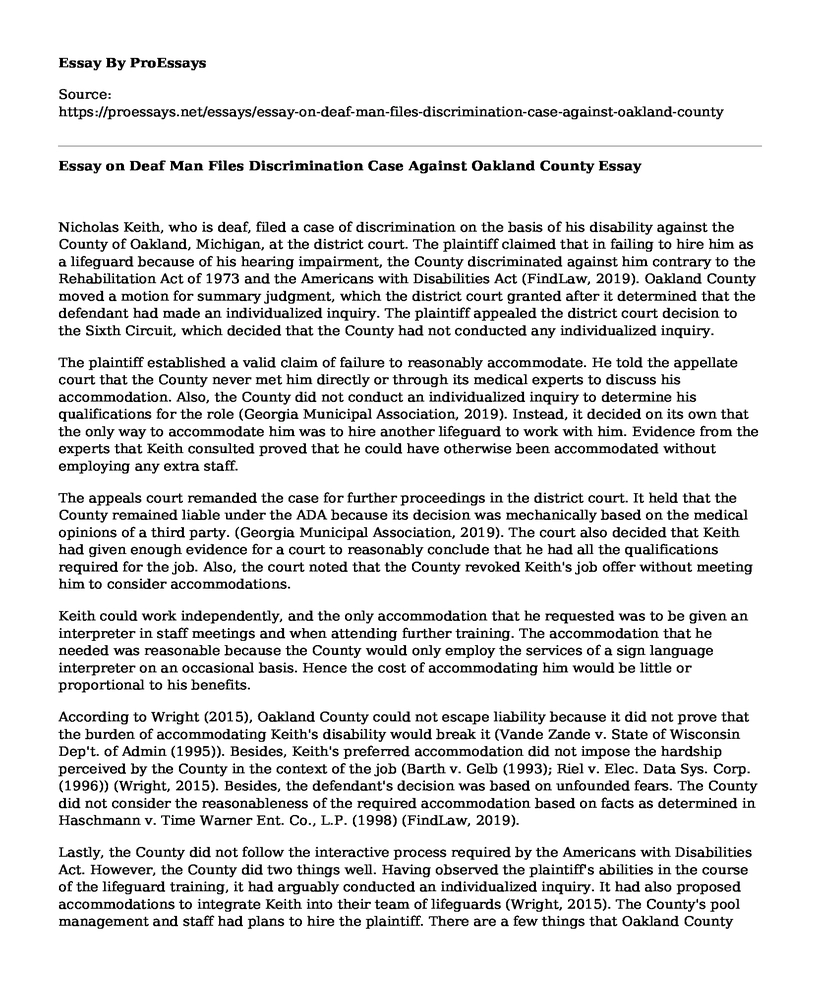Nicholas Keith, who is deaf, filed a case of discrimination on the basis of his disability against the County of Oakland, Michigan, at the district court. The plaintiff claimed that in failing to hire him as a lifeguard because of his hearing impairment, the County discriminated against him contrary to the Rehabilitation Act of 1973 and the Americans with Disabilities Act (FindLaw, 2019). Oakland County moved a motion for summary judgment, which the district court granted after it determined that the defendant had made an individualized inquiry. The plaintiff appealed the district court decision to the Sixth Circuit, which decided that the County had not conducted any individualized inquiry.
The plaintiff established a valid claim of failure to reasonably accommodate. He told the appellate court that the County never met him directly or through its medical experts to discuss his accommodation. Also, the County did not conduct an individualized inquiry to determine his qualifications for the role (Georgia Municipal Association, 2019). Instead, it decided on its own that the only way to accommodate him was to hire another lifeguard to work with him. Evidence from the experts that Keith consulted proved that he could have otherwise been accommodated without employing any extra staff.
The appeals court remanded the case for further proceedings in the district court. It held that the County remained liable under the ADA because its decision was mechanically based on the medical opinions of a third party. (Georgia Municipal Association, 2019). The court also decided that Keith had given enough evidence for a court to reasonably conclude that he had all the qualifications required for the job. Also, the court noted that the County revoked Keith's job offer without meeting him to consider accommodations.
Keith could work independently, and the only accommodation that he requested was to be given an interpreter in staff meetings and when attending further training. The accommodation that he needed was reasonable because the County would only employ the services of a sign language interpreter on an occasional basis. Hence the cost of accommodating him would be little or proportional to his benefits.
According to Wright (2015), Oakland County could not escape liability because it did not prove that the burden of accommodating Keith's disability would break it (Vande Zande v. State of Wisconsin Dep't. of Admin (1995)). Besides, Keith's preferred accommodation did not impose the hardship perceived by the County in the context of the job (Barth v. Gelb (1993); Riel v. Elec. Data Sys. Corp. (1996)) (Wright, 2015). Besides, the defendant's decision was based on unfounded fears. The County did not consider the reasonableness of the required accommodation based on facts as determined in Haschmann v. Time Warner Ent. Co., L.P. (1998) (FindLaw, 2019).
Lastly, the County did not follow the interactive process required by the Americans with Disabilities Act. However, the County did two things well. Having observed the plaintiff's abilities in the course of the lifeguard training, it had arguably conducted an individualized inquiry. It had also proposed accommodations to integrate Keith into their team of lifeguards (Wright, 2015). The County's pool management and staff had plans to hire the plaintiff. There are a few things that Oakland County could have done differently in the case of Keith. According to the ADA's underlying objective, the County ought to have considered Keith's actual medical condition, personal characteristics, and how his disability would affect his job performance. Instead of judging the applicant based on unfounded fear, the County should have relied on relevant his abilities and medical evidence. Ellis, through its representatives, also ought to have individually investigated the applicant's ability to do the job. They should have spoken with Dr. Work and given Keith a chance to show his abilities.
References
FindLaw. (2019). United States Court of Appeals,Sixth Circuit: Nicholas A. KEITH, Plaintiff-Appellant, v. COUNTY OF OAKLAND, Defendant-Appellee. Retrieved from https://caselaw.findlaw.com/us-6th-circuit/1620278.html
Georgia Municipal Association. (2019). Keith v. County of Oakland. Retrieved from https://www.gacities.com/Trending-Topics/Legal-Database/2010-2014/Keith-v-County-of-Oakland.aspx
Wright, P. (2015, September 18). Don't Judge a Book by Its Cover! The Sixth Circuit Provides Employers With A Roadmap For Hiring Persons With Disabilities. Retrieved from https://www.employerlawreport.com/2013/01/articles/eeo/dont-judge-a-book-by-its-cover-the-sixth-circuit-provides-employers-with-a-roadmap-for-hiring-persons-with-disabilities/
Cite this page
Essay on Deaf Man Files Discrimination Case Against Oakland County. (2023, Mar 16). Retrieved from https://proessays.net/essays/essay-on-deaf-man-files-discrimination-case-against-oakland-county
If you are the original author of this essay and no longer wish to have it published on the ProEssays website, please click below to request its removal:
- Sociology Essay Example: Race Still Matters
- The Concepts of Health, Disability, Illness and Behaviour Research Paper
- Research Paper on Transitional Nursing and Combating Veteran PTSD and Depression
- Abortion: Pro-Choice or Pro-Life Essay
- Racial Labels Throughout History Paper Example
- Paper Example on 68M Displaced by Conflict: Half are Children
- Women's Fight for Equal Rights: A Historical Struggle - Essay Sample







